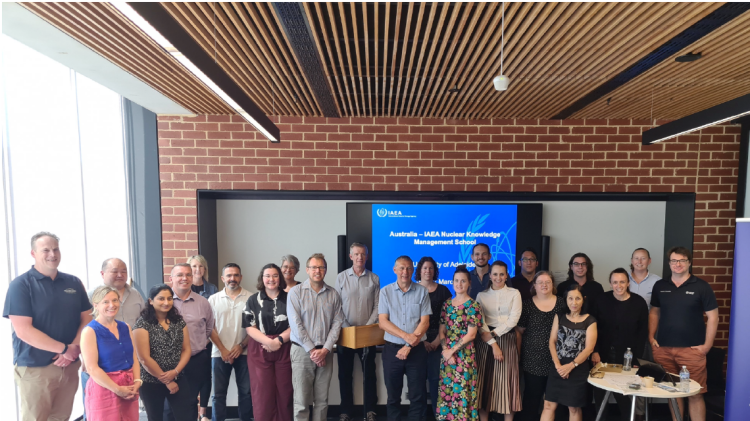IAEA Nuclear Knowledge Management School Expands to Oceania
Amid growing global interest in nuclear energy, the IAEA is ramping up its capacity building support in 2024 and kicked things off by organizing the first-ever Nuclear Knowledge Management (NKM) school in Australia, hosted by the University of Adelaide’s Centre for Radiation Research, Education and Innovation (CRREI). With knowledge preservation and robust education initiatives standing as key pillars of sustained success, the IAEA is helping countries ensure they are well equipped with the information and skills they need for long-term results.
The IAEA’s NKM school is a one-week course for young professionals, jointly organized with host country partner institutions on how to implement nuclear knowledge management programmes in nuclear science and technology organizations. Through a combination of lectures, case studies and group project work, participants engage with knowledge management methods on both a theoretical and practical level, cultivating skills vital for the sustainability of their organizations. As of February 2024, more than 1100 professionals have been trained through IAEA NKM schools.
The school in Adelaide was held from 18-22 March and attended by 22 participants from across Australia, including professionals from the Australian Radioactive Waste Agency (ARWA), the Australian Radiation Protection and Nuclear Safety Agency (ARPANSA), the Australian Safeguards and Non-proliferation Office (ASNO) and the South Australian Health and Medical Research Institute, among others.
Discussions on how to implement the clean energy transition often centre around the cutting-edge technologies, including advanced reactors, that promise to decarbonize the energy, industrial and transportation sectors. But it will take the hard work and skills of specialists in a wide range of disciplines to drive the journey to net zero.
To meet ambitious deployment goals, such as tripling global nuclear capacity by 2050, the nuclear power industry must address several challenges, including workforce development. The IAEA estimates that more than 2 million people are employed in the nuclear power sector, including those working in jobs indirectly supporting the industry. However, the Agency projects that around a third of this workforce will retire by 2033, and more than 1 million will be needed to replace the losses and support further nuclear power expansion.
Although there are currently no plans to introduce nuclear power in Australia, the country is centrally involved in the industry as one of the world’s biggest uranium producers. Australia also operates the Open Pool Australian Lightwater (OPAL) research reactor, which produces molybdenum-99 (Mo-99), a radioactive isotope used in diagnostic imaging, in addition to serving as a neutron source for applications including radiography. And at CRREI, researchers are examining everything from the effects of radiation on the human body to imaging dosimeters for detecting medical radiation.
“ARPANSA was pleased to be involved in this NKM school, as this course was relevant to not only human resources and resource management teams, but all areas of an organization,” said Laura Antoniazzi, Legal Counsel at ARPANSA. “This programme has helped us improve our knowledge sharing practices and ensure that knowledge is preserved, shared and built upon with the support of technology and established processes.”
The five-day course covered topics including NKM roles and responsibilities, risk assessment, and succession management. Participants from ARWA, ARPANSA, ASNO and the University of Adelaide presented case studies on their organizations’ experience with knowledge management. On the last day, participants took an exam assessing what they had learned during the week and received certificates affirming their successful completion of the course.
“The course really taught us the importance of NKM and its relevance to processes and development. I now feel equipped with the tools I need to apply what I learned in my workplace," said Helen Alexander, a Parliamentary and Secretariat Officer at ARWA. “The two visiting trainers both had a wealth of knowledge and experience in the field, and we were also fortunate to have guest speakers from Australian nuclear organizations, which ensured that we were given a great background into how NKM is implemented here in Australia.”
“It was great to have such an enthusiastic group of participants for the first NKM school in Australia,” said John Roberts, an IAEA knowledge management specialist. “We are grateful to CRREI for their cooperation in hosting the event and look forward to returning to deliver additional NKM schools in the future.”

The Nuclear Knowledge Management school in Adelaide was held from 18-22 March and attended by 22 participants from across Australia. (Photo: University of Adelaide)
Looking ahead, the IAEA will be delivering a full slate of capacity building activities throughout 2024. Several NKM and Nuclear Energy Management schools will be held, including a joint IAEA-International Centre for Theoretical Physics (ICTP) school marking the 20th anniversary of the partnership. IAEA Knowledge Management Assist Visits, designed to help nuclear organizations maintain and preserve knowledge, are also planned for several countries including Bangladesh, which is preparing to commission the first unit of its inaugural nuclear power plant by 2025.
Some other capacity building activities include an Interregional Workshop on the Development of Taxonomy for Small Modular Reactors and Microreactors, which was held last week in China. In addition, an Assessment Visit to Harbin Engineering University as well as an Assist Visit to Yerevan State University are planned as part of the IAEA’s International Nuclear Management Academy (INMA), an initiative which helps universities develop master’s degree programmes in various areas of nuclear technology management.
In July, the IAEA will host its first ever International Conference on Nuclear Knowledge Management and Human Resources Development in Vienna. The event aims to review global developments related to nuclear knowledge management and human resources development and consider the current and future challenges and opportunities. It will provide participants with practical solutions that they can use at organizational, national and international levels to develop and maintain the human resources needed to support safe and sustainable nuclear power programmes.
Topics to be covered will include:
-
NKM and HRD for building and sustaining capacity in nuclear organizations to support national nuclear programmes
-
Nuclear education and new NKM and HRD approaches to ensure a skilled workforce for the future
-
Enabling NKM and HRD to support sustainable development of advanced technologies
All persons wishing to participate in the event must be designated by an IAEA Member State or should be a member of an organization that has been invited to attend.
Click here for more information on how to register for the conference.





